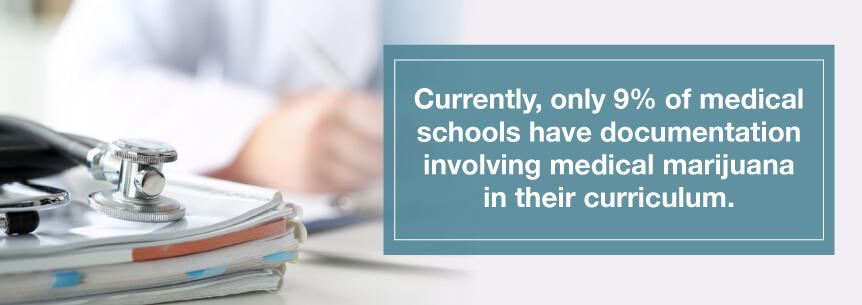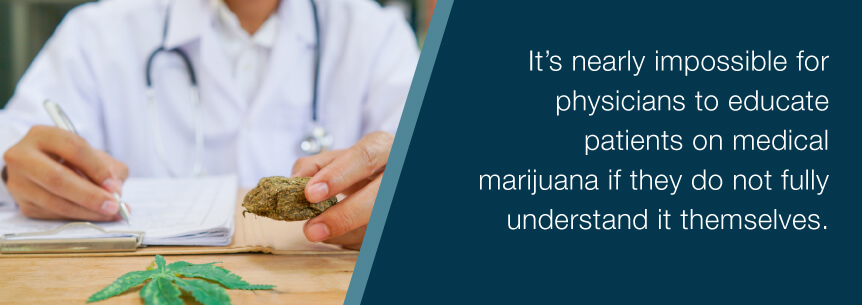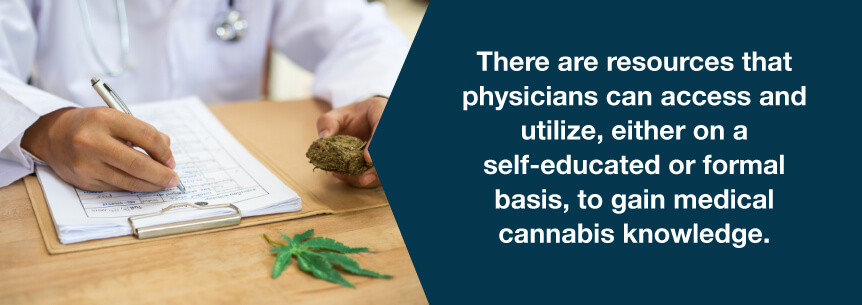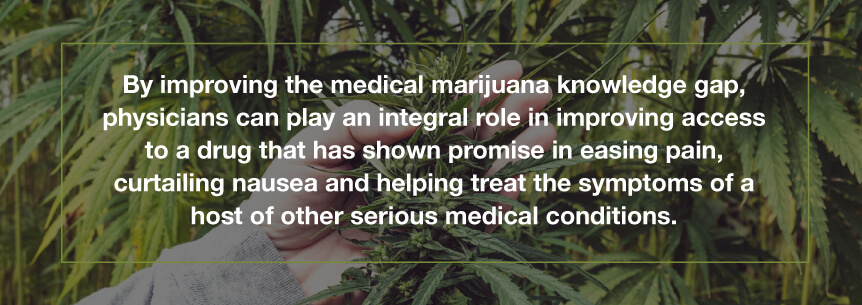
As more states begin legalizing the use of marijuana for medicinal purposes, we’re discovering a substantial knowledge gap about the benefits and effectiveness of medical marijuana within the medical community — and particularly with physicians.
Unfortunately, not only does the cannabis knowledge gap mean physicians are holding patients back from potentially helpful options — such as medical marijuana — for treatment and pain management, but it also inhibits patients from getting the education they need to make informed decisions about their health.
Closing this knowledge gap by educating physicians about medical marijuana can help to improve access for patients seeking an alternative therapeutic option for serious medical conditions. It may also weaken some of the cultural stigma associated with weed since it was declared illegal in 1923.
As researchers reveal more and more benefits of medical marijuana for treating certain serious medical conditions, it’s become increasingly evident of the vast need for medical marijuana resources for doctors, just like you.
If you’re a doctor who has yet to learn about the benefits of medical marijuana or have not yet become certified to recommend it to your patients, this guide will help you to:
At the basis of this knowledge gap is that many physicians aren’t sure about which conditions medical marijuana can legally treat in their respective states.
Some of the conditions approved for the use of medical marijuana in one or more states include:
Not all states allow the use of cannabis for the same conditions. As a physician, there’s a call to educate yourself — if you haven’t already done so — about the benefits of medicinal pot for the specific conditions that legally qualify under the laws of the states where you practice.
In addition to learning which conditions qualify for medical marijuana in the state in which you practice, you must also learn how it can and should be dispensed for maximum effect for individual patients and illnesses.
Despite the fact medical marijuana is now legal in 29 states, as well as the District of Columbia, few medical schools and academic training programs for the physicians of the future offer adequate education and support for this sensitive topic. Currently, only nine percent of medical schools have documentation involving medical marijuana in their curriculum. These are people currently training to become physicians in their respective states.

One study found that about nine out of 10 of physicians learn nothing about cannabis in medical school. It seems graduating medical students don’t have the fundamental knowledge of how medical marijuana can treat patients, making them ill-equipped to present medical cannabis to their patients as potential treatment options.
According to CNN, the problem isn’t isolated to medical students, however. One doctor, Jean Antonucci, who practices in Maine where medical cannabis has been legal for 20 years, feels ill-prepared to advise patients on their questions concerning medical marijuana and whether it could benefit them.
Physicians dedicate themselves to improving the lives of their patients. It’s their lack of knowledge related to medical marijuana that leaves many of them reluctant even to discuss medical pot with their patients, much less recommend it as a treatment option.
In fact, one study, appearing in the Journal of the American Board of Family Medicine states that more than 80 percent of family physicians felt they needed more medical training before they could recommend marijuana to patients.
While there is arguably some concern that placing too many requirements on physicians would cause more doctors to opt out of considering medical marijuana altogether, the fact remains that many physicians aren’t willing to face the liability of recommending cannabis without understanding the following things better:

Without better education and training for physicians, the fact is we may never understand how truly beneficial medical marijuana may prove to be because too few doctors will be willing to recommend it. It’s also nearly impossible for physicians to educate patients on medical marijuana if they do not fully understand it themselves.
CNN reports that some states are beginning to require physicians to take continuing education courses offering instruction on the effects marijuana has, including information related to the following:
Unfortunately, this isn’t enough. That leaves many physicians out in the cold when it comes to seeking new knowledge and getting an adequate fundamental understanding of how medical marijuana might affect their patients.
The not knowing part of the equation makes many physicians who are open to the idea of suggesting patients consider medical marijuana and certifying their conditions reluctant to do so. It essentially and ultimately robs patients of the potential comfort and relief medical weed has the potential to provide.
States that are implementing formal medical cannabis education programs include:
Other states considering or implementing similar programs include:
Maryland encourages training through its Medical Cannabis Commission website, but the training is not currently required. Many other states have similar policies encouraging physicians to take it upon themselves to seek out education concerning medical pot. Unfortunately, few offer definitive direction on where physicians can go to get this education.
Some states are reluctant to require physicians to undergo formal education before recommending cannabis to their patients. If states make it difficult for busy physicians, it might cause many of them to skip the opportunity. However, offering an adequate education to physicians provides far greater benefits than drawbacks, including those listed below:
The better physicians understand cannabis, in its many varieties, the better able they are to offer informed guidance to patients who will ultimately decide as to whether cannabis is something they’re interested in considering for treatment.
The most important benefit of educating doctors thoroughly about cannabis is that more patients will have access to treatment options that can provide relief from their symptoms as well as deliver a greater quality of life.
Currently, physicians don’t have an overabundance of options for gaining knowledge about medical marijuana through independent channels — at least, not yet from U.S. resources. However, there are resources that physicians can access and utilize, either on a self-educated or formal basis, to gain medical cannabis knowledge.

Self-education is, thus far, one of the best resources for many physicians interested in filling their cannabis knowledge gaps. It’s a necessity in the absence of state-provided resources throughout the country.
The Medical Cannabis Institute offers a promising self-directed study program. Here, physicians can turn to find individual courses to advance their knowledge of medical cannabis as well as state-approved courses, such as:
Physicians can elect to attend a variety of conferences and symposiums each year offered by the Society of Cannabis Clinicians to learn more about the many possible benefits of medical weed and obtain CME credits.
Marijuana Doctors is a comprehensive resource to educate both physicians and patients alike on medical marijuana. We enable users to learn about qualifying conditions and navigate state medical (and recreational) medical marijuana programs.
As a Medical Services Organization (MSO), we can connect patients with physicians like you and facilitate services in qualifying legal states. We’re also an online search, directory and booking platform that offers appointment booking functionality for primary care physicians and health clinics that have the ability to recommend medical cannabis treatment.
We offer the below and more.
Learn About Qualifying Conditions
Learn About State Medical Marijuana Laws
How Patients Book an Appointment With You
Some colleges offer classes that discuss medical marijuana in one form or another. Colleges are beginning to offer formalized courses on medical marijuana so that students entering the health field can feel confident in discussing medical marijuana as a treatment option for patients who meet the requirements of their states. They include:
Canada legalized cannabis in 2001, and it was a unified decision absent the divide between state and federal regulations experienced within the U.S.
U.S. physicians today can look to Canadian resources to better understand the potential benefits and risks cannabis represents as well as how it can be used to help their patients today. They cannot, however, offer insights into U.S. state-related regulations your patients may face due to differing opinions from one state to the next about the viability of medical weed.
The College of Family Physicians of Canada (CFPC) has approved a variety of programs related to dried cannabis, some of them available online.
While some of the Canadian programs available were created by cannabis producers, there are other options for physicians who prefer a more unbiased approach to their education related to cannabis, according to the U.S. National Library of Medicine/National Institutes of Health.
The Advancing Practice online certificate program from the Canadian Council on Continuing Education in Pharmacy is a good place to begin as this program offers the following:
The more physicians understand all the options available to patients for treatments, the better able they will be to make fully informed decisions about patients’ medical conditions and therapies available to them.

By improving the medical marijuana knowledge gap, physicians can play an integral role in improving access to a drug that has shown promise in easing pain, curtailing nausea and helping treat the symptoms of a host of other serious medical conditions.
MarijuanaDoctors.com is a comprehensive resource for doctors and patients alike looking to consider cannabis as a treatment option. We encourage you to peruse our website and sign up for our newsletter to keep updated on medical marijuana news, medical reports and more.
No Information on MarijuanaDoctors.Com should be used to diagnose, treat, prevent or cure any disease or condition. You can view our Full Disclaimer here.